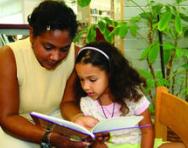Should you take your child to parents’ evening?

There has been a significant move in recent years towards giving children more responsibility for their own education. As a result, more and more schools are requesting that children attend parents’ evenings to hear their teachers’ feedback directly. But is this always a good idea?


Start a unique learning programme!
- Weekly programme for each school year
- Worksheets sent direct to your inbox
- Keeps your child's learning on track
Why take your child to parents’ evening?
Taking your child to parents’ evening can be an important way to encourage them to be more involved in their own learning. ‘The relationship with school involves child, teacher and parent, so it’s important that the lines of communication are kept open between all three,’ explains teacher and tutor Kate Morris. ‘As a teacher, you spend a lot of your working week with the child, so it’s good to be able to talk to them directly about their achievements and targets.’
Sometimes, if the teacher has concerns to raise, it can be helpful for your child to hear them from the horse’s mouth. ‘Often, children respond better to constructive criticism if it comes from the teacher, rather than the parent,’ says Kate.
When your child comes along to a parent-teacher meeting, they have an opportunity to speak one-to-one with their teacher about their learning. ‘It gives them a right of reply, which helps them to take more responsibility,’ Kate says. Children can also ask their own questions and raise any issues.
What are the drawbacks?
Many parents and teachers feel that when children are present at parents’ evening, conversations are less open. ‘My son’s school doesn’t allow children in the room; it enables us to discuss things without little ears overhearing,’ says parent Debs Clarke.
Indeed, some teachers may feel they have to sugar-coat feedback to avoid upsetting the child. ‘Imparting bad news is a difficult thing to do, and can be even harder if the child is present too,’ agrees Kate. ‘But parents’ evenings have little value unless parents are given the full picture.’
Children, especially younger ones, can also be a distraction. One survey found that 55 per cent of parents feel that parent-teacher meetings fail to inform them about how well their child is doing, and a sensible discussion can be even harder to achieve if you’re focusing on your child rather than the chat.
What’s the right age to involve your child?
There’s no definitive ‘right age’ to take your child to parents’ evening. Some schools insist that children are not brought along at any stage, while others request that they are, particularly in Key Stage 2.
If the decision about taking your child to parents’ evening rests with you, exercise your own judgement. ‘Generally, Key Stage 2 seems a sensible time to start bringing your child along, but bear in mind your child’s own personality and the subjects you need to discuss,’ Kate advises. A bright and confident Year 1 child might benefit from being there, whereas an older child who finds it hard to sit still and concentrate could prove too distracting. If you’re unsure, consider asking the teacher in advance.
Preparing for parents’ evening with your child
If you’re taking your child to a parent-teacher meeting, spend some time beforehand talking to them about what they want to get out of it. Children will often talk readily about what they’re enjoying at school, but find it harder to identify areas that they’re finding tricky. You might want to ask them:
- What’s your favourite thing to do at school?
- What do you find difficult?
- What do you think you need to work on?
- Is there anything you would like a bit more help with?
- Does the classroom work for you? Can you see the board and concentrate without distractions?
- Is there anything that you’re worried or unhappy about?
‘Our school encourages us to bring children along, and from Year 3 upwards, they actually spend some time in class preparing notes about their own targets,’ says mum Laura Sheridan.
At the meeting
Involving your child in parents’ evening means letting them participate in the conversation. ‘I wouldn’t change the information I gave out if a child was there, but I would make sure it was all presented in child-friendly language,’ says Kate. The teacher should speak to your child, not just to you, and invite them to play a part in the discussion.
That said, don't let your child take over. This is primarily an occasion for the teacher to update you on their progress, so be prepared to ask your child to pipe down if they’re interrupting or dominating. It can be helpful to take a book along in case they prove too distracting.
If there’s a sensitive issue to discuss, it’s usually best not to do this in front of your child. ‘In this case, I would ask the child to sit outside for a moment,’ Kate explains. Or you could ask to see the teacher on another occasion, without your child there. ‘I make an appointment at another time, or email the teacher in confidence,’ says parent Karen Staves.
After the appointment
Having made the effort to involve your child in parents’ evening, debriefing afterwards is a must. ‘There is always room for misunderstanding, so it’s important to help your child make sense of what has been said,’ Kate explains. ‘Always big up the good things that the teacher has said, and talk through any targets, goals or next steps so your child knows what is expected. It shows that you and the teacher are working as a team, which will help your child succeed.’

Give your child a headstart
- FREE articles & expert information
- FREE resources & activities
- FREE homework help








